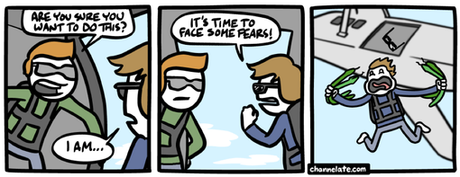Originally published on the Global Ecology Blog.
Many students start a PhD by just continuing in the same subject and same institution from their Masters or Honours project. But this is not necessarily the best way to do things. In fact, switching fields and countries for your PhD could end up giving you a decide boost to your career.
Sure, continuing a project with the same supervisors has a lot of advantages for both the student and supervisor. As students, we are familiar with the environment, the research topic, and the specific, technological know-how of our current field. We also know that we have no more than 3 to 4 years to complete a PhD thesis. This period is short, and so avoiding the time to adapt to a new setting and topic is a distinct advantage. From the perspective of the supervisor, this time-saving can also increase the likelihood that the student will finish in time
Given these reasons, it’s difficult to argue why someone should contemplate doing things differently. This was exactly my point of view a few years ago, but I am now convinced that I was wrong.
I decided to do a PhD when I was 16 after an interview I did with a professor as part of a high school project. His eyes were bright, and his obvious passion for the subject fascinated me. A few years later, my first internship in a research lab was so captivating that I subsequently chose my courses and internships accordingly. I had decided to do a PhD in that field, and to become an ‘expert’. In so doing, I thought that I would be more likely to get one of the local PhD scholarships that were on offer. But at the end of my Masters degree, I missed out on being selected.
After the inevitable end-of-the-world feeling had dissipated somewhat, I changed my strategy. Subconsciously, I was complying with the empirical scientific method: my first hypothesis was wrong! I was so disappointed that I decided to open up my possibilities by looking for a PhD position anywhere, in any topic related to my general postgraduate background. I just constrained myself by following one rule — I had to find the topic simultaneously challenging and puzzling. In other words, I decided to skydive my PhD.
Fortunately for me I found just such an opportunity rather quickly, and I applied. In fact, the interaction with the supervisors was highly positive, but I was still surprised to have been selected. Not only was it about something on which I could not imagine working just a few months beforehand, it was also at the other end of the world in an English-speaking country. I had to restart everything from scratch — a leap into the unknown — and it was exciting.
Saying that this alone is a good reason to travel and obviously satisfy your need to see the world would probably not surprise you. But discussing why it is good for the mind and soul to travel is probably out of scope, but I am sure the reasons won’t be lost on you anyway.
Such an experience is also a high-performance skill enhancer. Yes, the imposter syndrome and the adaptation time are typically prevalent as a result; however, it generally provides an opportunity to learn at a much faster rate than you otherwise would. In fact, you are forced constantly to add brand new tools to your existing toolkit. And with a little luck, you might even be able to use at least some of your previous expertise in your new project.
While it is correct to conclude that your naivety of the topic could be dangerous, but with a little self-motivation you can instead turn that risk into creative and productive outcomes. Yes, you will soon realize that you will have unique views in the way you think you should tackle particular research questions, and this can lead to both novel approaches as well as synergies with existing ones. In this way, you — the student, the supervisor, and indeed the research topic itself will almost assuredly turn out to be more comprehensive, creative, and holistic than they would otherwise be. So, you should never view yourself as an imposter; rather, you provide a perspective perfectly poised to contribute originally to the knowledge of your new field, which is, of course, one of the main requirements of a good PhD.

If you are not a native English speaker, living and working in an English-speaking country will also fast-track your English-language skills to operate better within the English-dominated world of science, wherever you might end up actually doing your research. While you might be disappointed in the beginning after realising that it’s far more challenging to explain your research in English than in your native tongue, it’s worth persevering. Soon you will become an expert speaker, writer, and presenter in English just by being forced to speak and write in English all the time.
A word of caution — if you are willing to do a PhD, do not necessarily view the field-switch as the default option. Perhaps you enjoy feeling safe and are excited about your current topic and place of research. That said, there are many advantages to changing fields and countries. While it can be difficult at times, such PhDs are opportunities to enhance your skills considerably while enjoying a little passive travel on the side.
Do not hesitate; it is time skydive your PhD!


